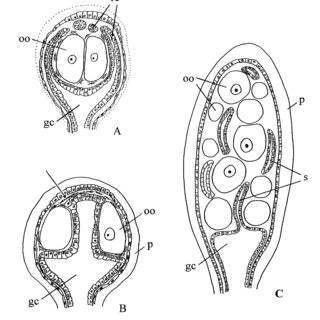
gonophore [gon-uh-fawr, -fohr] ExamplesWord Origin noun Zoology.
- an asexually produced bud in hydrozoans that gives rise to the equivalent of a medusa.
Origin of gonophore First recorded in 1825–35; gono- + -phore Related formsgon·o·phor·ic [gon-uh-fawr-ik, -for-] /ˌgɒn əˈfɔr ɪk, -ˈfɒr-/, go·noph·o·rous [goh-nof-er-uh s] /goʊˈnɒf ər əs/, adjective Examples from the Web for gonophore Historical Examples of gonophore
The medusae may be set free or may remain attached to the polyp-colony and degenerate into a gonophore.
Encyclopaedia Britannica, 11th Edition, Volume 14, Slice 2
Various
The eudoxome (Calycophorida), consisting of a bract, siphon, tentacle and gonophore; when free it is known as Eudoxia.
Encyclopaedia Britannica, 11th Edition, Volume 14, Slice 2
Various
British Dictionary definitions for gonophore gonophore noun
- zoology a polyp in certain coelenterates that bears gonads
- botany an elongated structure in certain flowers that bears the stamens and pistil above the level of the other flower parts
Derived Formsgonophoric (ˌɡɒnəʊˈfɒrɪk) or gonophorous (ɡəʊˈnɒfərəs), adjective gonophore in Medicine gonophore [gŏn′ə-fôr′] n.
- A structure, such as an oviduct, that stores or conducts sex cells.
gonophore in Science gonophore [gŏn′ə-fôr′]
- A structure bearing or consisting of a reproductive organ or part, such as the one of the buds that produce sperm or eggs on a cnidarian polyp.
 Liberal Dictionary English Dictionary
Liberal Dictionary English Dictionary